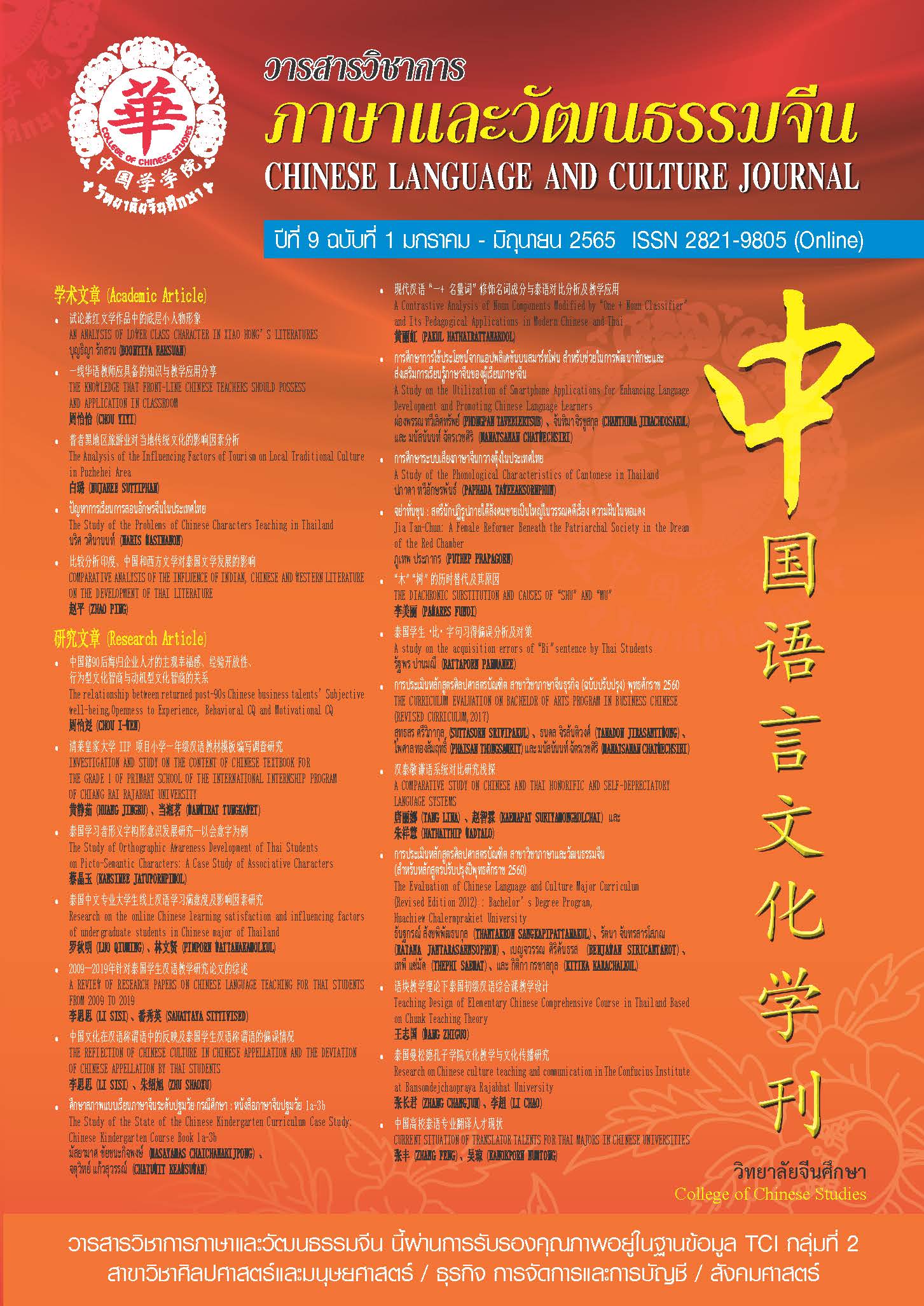การประเมินหลักสูตรศิลปศาสตรบัณฑิต สาขาวิชาภาษาจีนธุรกิจ (ฉบับปรับปรุง) พุทธศักราช 2560
THE CURRICULUM EVALUATION ON BACHELOR OF ARTS PROGRAM IN BUSINESS CHINESE (REVISED CURRICULUM, 2017)
Keywords:
Curriculum, Student, graduated students, employers, lecturersAbstract
The Curriculum Evaluation on Bachelor of Arts (Business Chinese) aimed to Revised Curriculum Academic Year 2017 aimed to 1) analyze curriculum and quality of curriculum implementation in term of the contexts: the objective, structure, and content of the curriculum, 2) evaluate the input: lecturers, students, and learning support, 3) evaluate the process of the curriculum administration and teaching & learning management including teaching and learning activities, assessment & evaluation of learning, 4) evaluate the outcome: quality of the graduated students.
The population of the curriculum evaluation on Bachelor of Arts Program: Business Chinese revised curriculum, year 2017 consists the 10 of the curriculum Instructors Information and the lecturers in Bachelor of Arts Program: Business Chinese, 41 graduated students of the program in academic year 2019, 41 existing students with normal status, and 40 graduated students’ employers. The data collection tools are consisted by Lecturers’ Opinion Survey, Graduated students’ Opinion Survey, Students’ Opinion Survey and Graduated Students’ employers’ Opinion Survey.
Research Result
- The satisfaction evaluation result of employers divided into 6 areas: ethics and morals, knowledge, cognitive skills, interpersonal skills and responsibility, numerical analysis, communication, and Information technology skills (ICT), and professional skills. In overall the statistics of the employers was at the highest level. The outstanding characteristics of the graduates were volunteer, willingness to work, seeking new knowledge in Business Chinese, knowledgeable of Business Chinese, gentle, diligent, and seek career advancement. There is some skill that the graduated students should be improved are computer skills, increase more knowledge of Chinese for careers and improve more about the computer programs due to the pandemic Covid-19 situation such as Microsoft Teams, ZOOM, Google Meet, Webex, etc.
- The satisfaction evaluation result of the graduated students towards teaching management in the curriculum consists of Major Required Courses and Elective Subjects has the highest overall average and the opinions on teaching and learning management in General subjects was highest level which there are the recommendation to revise the contents to be more modern and should add courses that focus on each career field for more appropriate on teaching and learning. The faculty should set a program to enhance the knowledge and working skills for students. The curriculum should add more subjects which learner is able to use in their working life, such as Chinese in the office, be more focus on the Education Cooperative and to comply with working the curriculum should have more modern subjects such as Digital Economics. Some subject as General Education subjects (English) and Minor subjects should be eliminated for efficiency of studying in Business Chinese subjects.
- The satisfaction evaluation result of lecturers towards the teaching and learning management of the curriculum was at the highest-level overall average which there are the opinions to revise some content in some subject to be more modern, some the subject should be shorten for the appropriateness of teaching and learning. The subjects about the business should be added for preparing the labors to support the trading market in this presents. The Economic courses should be added that are suitable for the current era, such as Digital Economy.
- The satisfaction evaluation result of students towards the teaching and learning management of the curriculum consists of Major Required Courses and Elective Subjects was at the highest-level overall average and has the opinion for the teaching and learning management of the General Education subjects in high-level and has the opinion that some subject such as Minor subject and General Education subject (English) should be shorten for the appropriateness of teaching and learning. The Professional courses should be added.
References
กาญจนา คุณารักษ์. (2543) หลักสูตรและการพัฒนา .นครปฐม: โครงการส่งเสริมการผลิตตำราและเอกสารการสอนคณะศึกษาศาสตร์ มหาวิทยาลัยศิลปากร.
กาญจนา มณีแสง.(2541) การประเมินหลักสูตรการศึกษาบัณฑิตของมหาวิทยาลัยบูรพา รายงานวิจัยภาควิชาวิจัยและวัดผลการศึกษา คณะศึกษาศาสตร์, มหาวิทยาลัยบูรพา.
กระทรวงศึกษาธิการ. (2548) สำนักงานมาตรฐานและประเมินผลอุดมศึกษา.เกณฑ์มาตรฐาน หลักสูตร
อุดมศึกษา พ.ศ.2548 กระทรวงศึกษาธิการ.กรุงเทพมหานคร : สำนักงานคณะกรรมการการอุดมศึกษา
จรัสศรี จิรภาส. (2548) การประเมินหลักสูตรศิลปศาสตรบัณฑิต สาขาวิชาภาษาจีน ฉบับปรับปรุง พ.ศ.2544 สำนักพัฒนาวิชาการ มหาวิทยาลัยหัวเฉียวเฉลิมพระเกียรติ.
จิรศักดิ์ สุรังคพิพรรธน์. (2540) การพัฒนาแบบการประเมินหลักสูตรระดับปริญญาตรี สถาบันเทคโนโลยีราชมงคล. วิทยานิพนธ์ปริญญาโท,จุฬาลงกรณ์มหาวิทยาลัย.
บุญชม ศรีสะอาด. (2546) การพัฒนาหลักสูตรและการวิจัยเกี่ยวกับหลักสูตร.กรุงเทพฯ: สุวีรยาสาส์น
รัตนา ทิมเมือง.(2551) การประเมินหลักสูตรประกาศนียบัตรบัณฑิต สาขาวิชาการสื่อสารสุขภาพ พุทธศักราช 2551 บัณฑิตวิทยาลัย มหาวิทยาลัยหัวเฉียวเฉลิมพระเกียรติ
รุจิร์ ภู่สาระ. (2545) การพัฒนาหลักสูตร : แนวปฏิรูปการศึกษา. กรุงเทพฯ : บริษัทบุ๊ค พอยท์ จำกัด.
วสันต์ ทองไทย. (2551) การประเมินหลักสูตรจากทฤษฎีสู่ปฏิบัติ. สาขาวิจัยและประเมินผลการศึกษา ภาควิชาการศึกษา คณะศึกษาศาสตร์,มหาวิทยาลัยเกษตรศาสตร์.[ออนไลน์]แหล่งที่มา : http://www.doed.edu.ku.ac.th/article/eva_curri.pdf. 16 เมษายน 2554
วรนุช จิตต์เจียรนัย.(2546) การประเมินหลักสูตรประกาศนียบัตรวิชาชีพ.ประเภทวิชาศิลปกรรม พุทธศักราช 2538 ที่ใช้ในวิทยาลัยอาชีวศึกษาภาคตะวันออก สังกัดกรมอาชีวศึกษา. วิทยานิพนธ์ปริญญาโท,มหาวิทยาลัยบูรพา
วิชัย วงษ์ใหญ่.(2537) กระบวนการพัฒนาหลักสูตรและการเรียนการสอนภาคปฏิบัติ.สุวีริยาสาส์น: กรุงเทพฯ.
สุนีย์ ภู่พันธ์. (2546) แนวคิดพื้นฐานการสร้างและการพัฒนาหลักสูตร. เชียงใหม่ : เชียงใหม่โรงพิมพ์แสงศิลป์.
อุไรพรรณ เจนวาณิชยานนท์. วุฒิพงษ์ ทองก้อน. สิริสรณ์ ทิพทวี. (2546) การประเมินหลักสูตรหมวดวิชาศึกษาทั่วไป มหาวิทยาหัวเฉียวเฉลิมพระเกียรติ พ.ศ.2546 สำนักพิมพ์ มหาวิทยาลัยหัวเฉียวเฉลิมพระเกียรติ.
Downloads
Published
How to Cite
Issue
Section
License
Copyright (c) 2022 Journal of Chinese Language and Culture, Huachiew Chalermprakiet University

This work is licensed under a Creative Commons Attribution-NonCommercial-NoDerivatives 4.0 International License.
บทความที่ได้รับการตีพิมพ์เป็นลิขสิทธิ์ของวารสารภาษาและวัฒนธรรมจีน มหาวิทยาลัยหัวเฉียวเฉลิมพระเกียรติ
บทความใน “วารสารวิชาการภาษาและวัฒนธรรมจีน” เป็นทรรศนะของผู้เขียนโดยเฉพาะ กองบรรณาธิการไม่มีส่วนในความคิดเห็นในข้อเขียนเหล่านั้น




